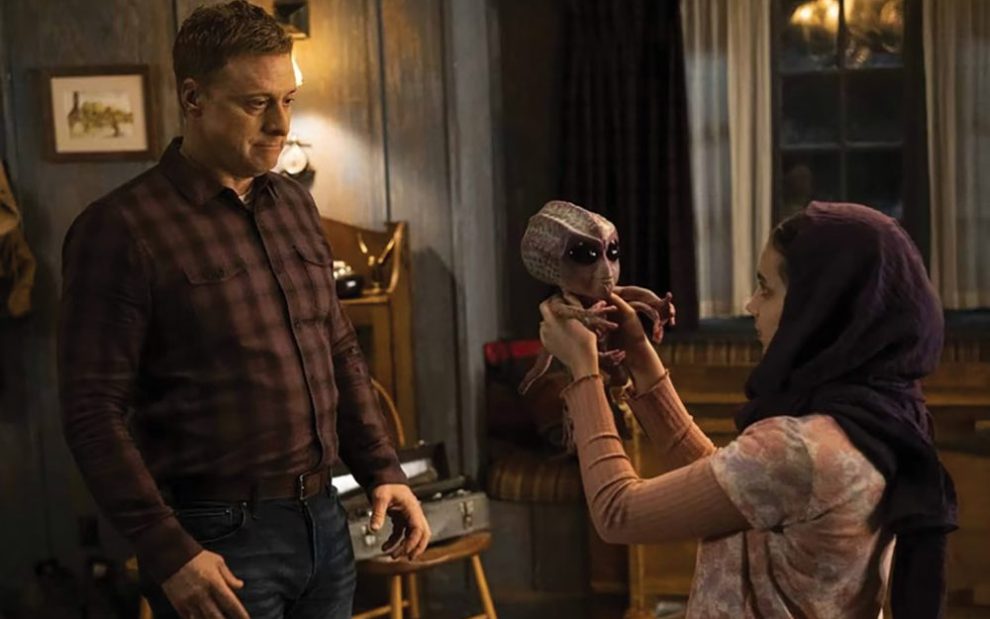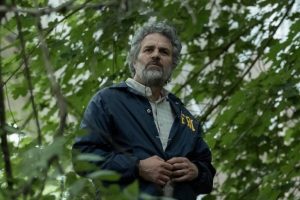An alien crashes to Earth near a remote cabin, tosses its owner into the lake, replicates his DNA, takes on his identity as a vacationing physician, and continues on an otherworldly mission to destroy humanity.
But wait. The tiny nearby town of Patience needs a doctor, and the alien is pressed into service by locals who believe he is Harry Vanderspiegle, M.D. Harry becomes a trusted figure in small town life, caring for earaches and emergencies while studying human anatomy on YouTube and human behavior on CSI episodes.
The streaming series Resident Alien (in its third season on the SyFy channel and available on Netflix) is modern, witty, and warm—while also being scary, dramatic, and profound—and is wise about what it means to be an earthling.
While trying to locate his lost-in-the-crash device that will wipe out humans, Harry is distracted by and drawn into the messy lives of the townfolk. Despite himself, he becomes fond of humans (and of pie), contemplates the foibles and strengths of earthlings, and begins to doubt his mission of annihilation.
This show is comedy, drama, whodunit, suspense, adventure, and science fiction—Northern Exposure meets Stargate meets Doc Martin. The writing is brilliant and fresh: Turn on the subtitles or you’ll miss the best bits.
Alan Tudyk as Harry is charismatic and compelling. His adept physical comedy as an alien inhabiting an unfamiliar human body is delightful, and his emotional transparency as an alien experiencing feelings for the first time is poignant. Watching him figure out how knees bend is a hoot. Watching him wonder why his chest aches when he loses at love is heartbreaking. Tudyk lets us feel the struggle of trying to fit into a world not your own. Harry is somehow charming, though he’s here to kill us all.
Characters like clinic nurse Asta Twelvetrees (Sara Tomko), her father Dan (Gary Farmer), and their large extended family offer a rare view into the lives of Indigenous Americans. The overbearing and clueless sheriff (Corey Reynolds) wants the town to call him “Big Black,” but no one does, and he eventually discloses a personal tragedy that makes him more human. His deputy, Liv (Elizabeth Bowen), does all the real police work, gets none of the credit, and mutters unexpected and hilarious one-liners that go over the sheriff’s head. Bowen makes every scene she’s in more humane.
Middle-schooler Max (Judah Prehn) can somehow see through Harry’s DNA disguise to his real, reptilian alien self and opens his mouth to scream every time he sees the town doctor. Max is a cheeky kid and soon evolves to barking playground taunts at the tall alien, who falls hard for every third-grade witticism. Max’s school friend, Sahar (Gracelyn Awad Rinke), is the brains behind various investigations and errands the pair run for Harry. Not many shows devote so much dialogue to conversations between adults and children. These two kiddos, mature beyond their years and the only ones who know who the alien really is (for a while, anyway), put Harry through the wringer in a manner that will be instantly recognizable to anyone who’s a parent.
Bartender D’Arcy Bloom (Alice Wetterlund) sustained a tragic injury in an Olympic ski competition, makes bad life choices, and is Asta’s best friend. Max’s parents, the naïve Mayor Ben Hawthorne (Levi Fiehler) and his schoolteacher wife Kate (Meredith Garretson), another ex-competitive athlete, shelter unexpected secrets.
There are villains, alien hunters, abductees, time travelers, and military folk (notably Linda Hamilton as General Eleanor McCallister, chasing UFOs for dark reasons). If some of the themes of Resident Alien feel familiar to fans of Ancient Aliens, the appearance of Giorgio A. Tsoukalos playing himself at an alien experiencer convention will be a particular delight. And then there’s Nathan Fillion, who voices a talking octopus living in a sushi restaurant fish tank whom Harry calls “cousin.”
The cast includes wonderful actors who look like regular folks, rather than slick Hollywood types—a little chubby, a little not-so-cute, a lot utterly believable—and the female cast members wear appropriate clothing for winter in Colorado. There is very little cleavage, there are sensible shoes, and such choices are refreshing and relatable. It’s rather like watching the BBC.
Harry’s journey is physical and emotional, and by not being human through any of it, he reveals the humanity in all of it—being baffled by love, making wrong choices for the right reasons, learning wisdom from the mouths of babes, and eating excessive amounts of pizza. As he searches the mountains for his snow-covered spaceship, he is perplexed by his fading sense of urgency about completing his mission and his deepening engagement with the lives of his new friends, the humans.
We come to see that, in a sense, Patience is a town made up entirely of aliens—people who, to someone somewhere, might be considered “other” until you got to know them and recognized yourself in their eyes, hearts, and DNA. As would we all.
This article also appears in the June 2024 issue of U.S. Catholic (Vol. 89, No. 6, pages 36-37). Click here to subscribe to the magazine.
Image: James Dittiger/SYFY














Add comment